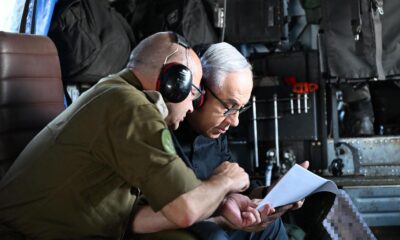International News
Qatar Facilitates Hamas’ Release Of 24 Hostages

Friday saw the transfer of 24 hostages to the Red Cross in Gaza, mediated by Qatar on behalf of Hamas.
Foreign ministry spokesperson Majed Al Ansari, in a statement on X (formerly Twitter), clarified that among those released were 13 Israeli citizens (some with dual nationality), 10 Thai citizens, and one Filipino citizen.
He stated that under a negotiated deal exchanging hostages held by Hamas for Palestinian detainees, 39 women and children detained in Israeli jails were released.
Qatar, along with the US and Egypt, engaged in extensive talks over several weeks to secure the freedom of 50 civilians from Gaza, a truce lasting four days, and provisions for humanitarian aid.
A source familiar with the discussions revealed that the 10 Thais and one Filipino who were freed were additional to the 50 Israeli hostages slated for release.
The source, who requested anonymity due to the sensitivity of the negotiations stated that the hostages’ liberation was ensured “after the visit of Thailand’s foreign minister to Qatar and through mediation by Qatar and Egypt.”
The planned release of hostages, spread out over a four-day truce, marks the largest number to be freed since Hamas militants breached Gaza’s fortified border on October 7, executing the most fatal attack in Israel’s history.
Israel says the attack killed 1,200 people, mostly civilians, and saw around 240 more taken hostage, among them elderly people and children.
Responding to the attack, Israel launched a relentless bombing campaign and ground offensive in Hamas-ruled Gaza, which the Hamas government says has killed more than 15,000 people, thousands of them children.
Qatar has stated that the initial four-day truce may be prolonged if additional agreements for hostage and prisoner exchanges can be reached.
International News
Lawmaker Introduces Bill To Allow Trump A Third Presidential Run

In a controversial move, Republican Representative Andy Ogles has introduced a resolution aimed at amending the U.S. Constitution to permit former and current President Donald Trump to run for a third term in office.
The proposal, announced on Thursday, seeks to revise the 22nd Amendment, which limits presidents to two terms.
Ogles argued that Trump is uniquely equipped to address the nation’s challenges and lead a turnaround for the United States.
READ MORE: EDO: SUBEB Chair, 6 Commissioners, Board Chairs Take Oath Of office
“No person shall be elected to the office of the President more than three times,” Ogles said in his statement. “He has proven himself to be the only figure in modern history capable of reversing our nation’s decay and restoring America to greatness. He must be given the time necessary to accomplish that goal.”
The congressman also underscored the importance of giving Trump the tools needed to address what he described as damage caused by the Biden administration.
“We must provide Trump with every resource necessary to correct the disastrous course set by the Biden administration,” he added.
“He is dedicated to restoring the republic and saving our country, and we, as legislators and as states, must do everything in our power to support him.”
The resolution calls for a constitutional amendment to modify the 22nd Amendment, which was ratified in 1951 following Franklin D. Roosevelt’s unprecedented four-term presidency from 1933 to 1945.
Roosevelt’s extended time in office spurred fears of presidential overreach, leading to the adoption of term limits.
Trump, who won the 2024 presidential election and returned to office, has previously downplayed the idea of seeking a third term.
However, during a conversation with Republican lawmakers, he humorously alluded to the possibility.
“I suspect I won’t be running again unless you do something,” Trump said. “Unless you say, ‘he’s so good, we have to just figure it out.’”
Ogles lauded Trump’s actions during his second term, citing executive orders aimed at securing the southern border, restricting gender identities to male and female, boosting energy production, and withdrawing the U.S. from the World Health Organization.
These measures, according to Ogles, demonstrate Trump’s ability to restore America’s standing and address critical issues.
The 22nd Amendment, proposed in 1947 and ratified four years later, was designed to uphold the principle of limited presidential terms first established by George Washington, the nation’s first president.
Washington voluntarily stepped down after two terms, warning against any president serving so long as to resemble a monarch or dictator.
Republicans currently hold a slim three-seat majority in the House of Representatives, but amending the Constitution is a daunting task.
The proposed amendment would require approval from two-thirds of both the House and Senate, as well as ratification by three-fourths of the states—a high bar in today’s deeply divided political climate.
While Ogles’ proposal is unlikely to succeed, it reflects the enduring loyalty Trump commands among his supporters and within the Republican Party.
The resolution has already drawn criticism from opponents who argue it undermines democratic principles, while supporters insist it is necessary to allow Trump to complete what they view as his mission to “restore America’s greatness.”
International News
Bangkok Shuts Over 350 Schools As Air Pollution Reaches Dangerous Levels
Bangkok authorities closed more than 350 schools on Friday due to hazardous air pollution, marking the largest mass closure since 2020.
This comes as the Thai capital was ranked the world’s seventh-most polluted major city, according to air quality monitor IQAir.
The Bangkok Metropolitan Administration (BMA) announced that 352 schools across 31 districts were shut down to protect students from the worsening air quality.
By Friday morning, PM2.5 pollutant levels — fine particles small enough to enter the bloodstream — reached 108 micrograms per cubic meter, far exceeding the World Health Organization’s recommended limit of 15 micrograms for daily exposure.
READ MORE: Nigeria Can Achieve 5.5% GDP Growth – NESG
Air pollution in Southeast Asia typically spikes during the colder months, as stagnant air combines with smoke from crop burning and vehicle emissions.
Authorities reported that this week’s pollution levels were among the highest in years, prompting measures not seen since the pandemic.
On Thursday, more than 250 schools in Bangkok were already closed, and city officials urged residents to work from home while restricting heavy vehicles from entering the capital.
The Interior Ministry has also banned the agricultural practice of stubble burning, threatening legal action against offenders.
Prime Minister Paetongtarn Shinawatra, speaking from the World Economic Forum in Switzerland, called for urgent measures to combat the crisis, including limiting construction projects and cooperating with neighboring countries.
Both Vietnam’s Ho Chi Minh City and Cambodia’s Phnom Penh also ranked among the world’s top 10 most polluted cities on Friday, with their governments facing mounting pressure to address air quality concerns.
Despite international attention, Cambodian authorities downplayed the issue, stating that their air quality remained within acceptable levels.
“Other countries have their own standards. Cambodia has our own standard to determine the air quality,” said Environment Ministry spokesperson Khvay Atitya.
International News
Turkish Airlines Resumes Flights To Damascus After 13-Year Hiatus
In a historic move, Turkey’s national flag carrier, Turkish Airlines, has resumed flights to the Syrian capital Damascus after a 13-year suspension.
The first flight, carrying 349 passengers, departed from Istanbul International Airport on Thursday morning, according to Turkey’s state news agency Anadolu.
The resumption of flights marks the end of a pause dating back to April 2012, when the airline suspended operations due to the onset of the Syrian civil war.
READ ALSO: Nuri Sahin Fired As Borussia Dortmund Head Coach
The decision comes as relations between the two nations improve and reflects a growing trend of Syrians returning to their homeland after years of displacement.
Turkey, which hosts approximately 3 million Syrian refugees—the highest number worldwide—has witnessed many Syrians preparing to return home.
Anadolu reported that several passengers on Thursday’s flight were traveling to Syria for the first time in over a decade.
“I feel like I’m in a dream,” said Ahmet Kiraz, a passenger who had lived in Turkey since 2012. Kiraz expressed his disbelief at finally being able to return home, a moment he had thought might never come.
Images from the scene showed travelers boarding the plane with the Syrian flag draped across their shoulders, a symbol of both pride and a longing for their homeland.
Turkish Airlines announced plans to operate three flights per week to Damascus, with further details expected to be disclosed later in the day.
















